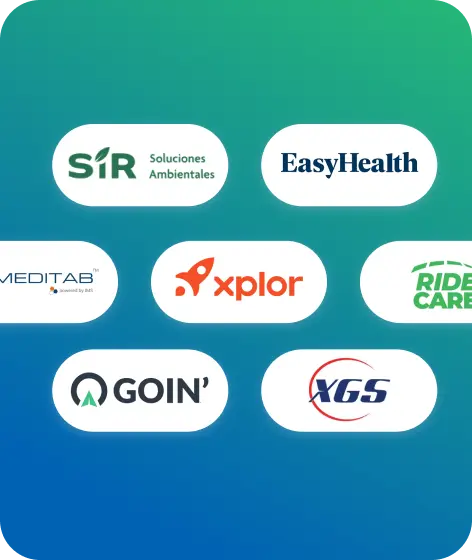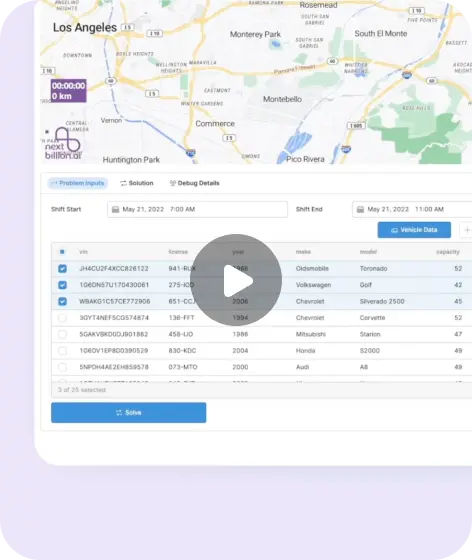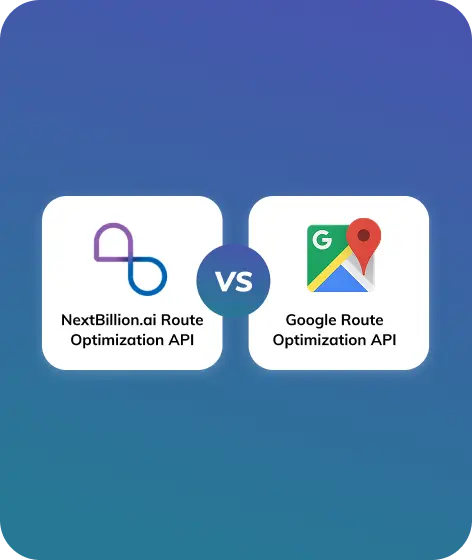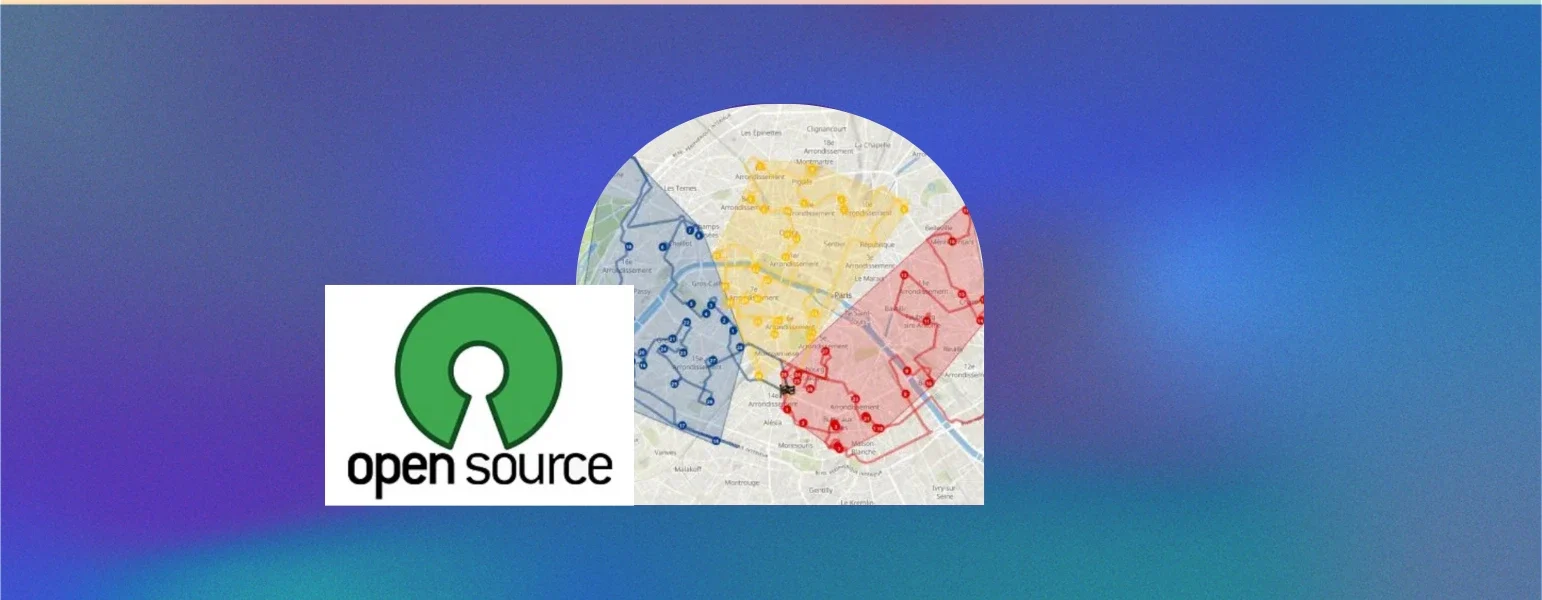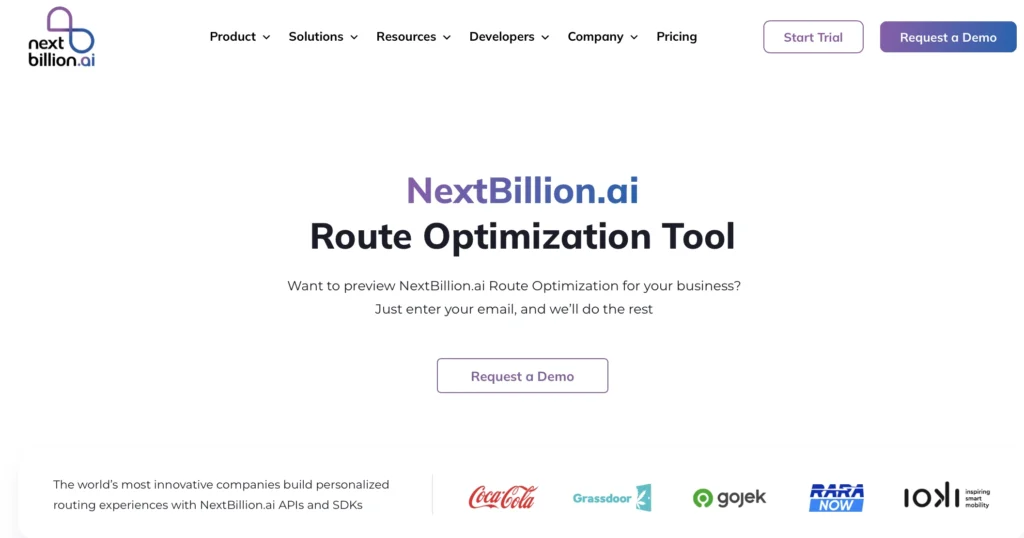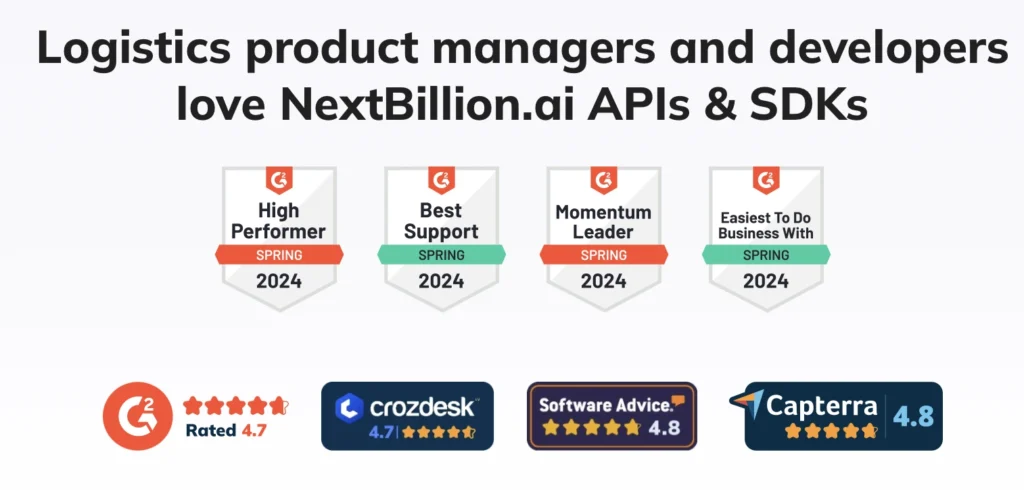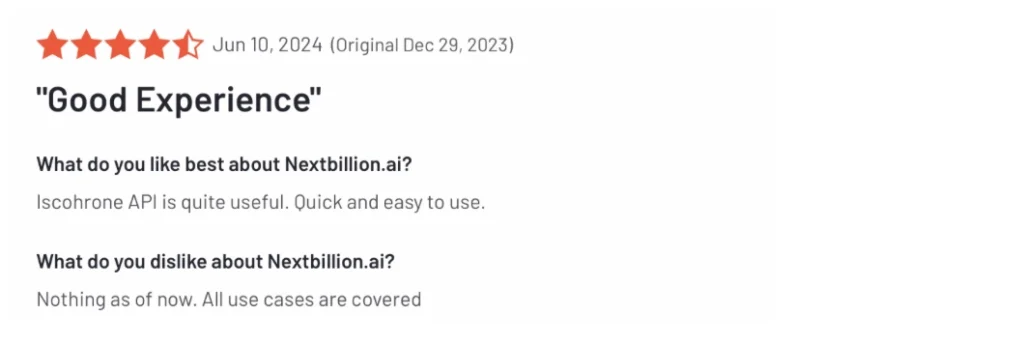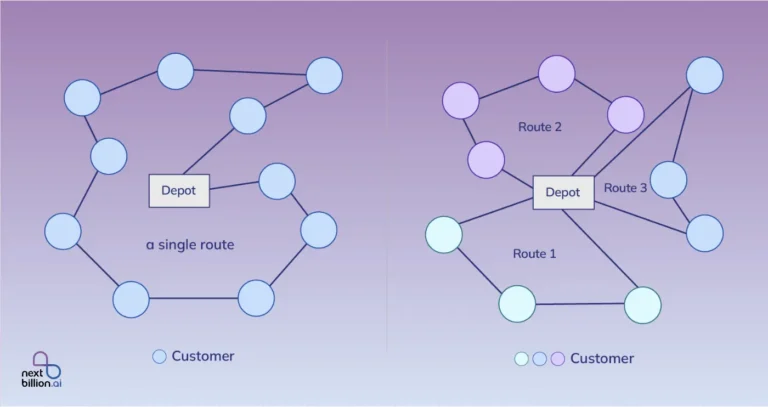
Table of Contents
In 2025, efficient Route Optimization has become a cornerstone for businesses across various sectors from logistics and delivery services to field operations and urban mobility. Open-source tools are at the forefront of this transformation, offering cost-effective, customizable, and flexible solutions that empower organizations to streamline operations, reduce fuel consumption, and improve customer satisfaction.
The top 10 open-source tools for route optimization in 2025 encompass a diverse range of functionalities. These tools are engineered to handle complex routing challenges, such as multi-stop planning, real-time traffic adjustments, and dynamic constraint management, while also offering seamless integration with other systems. Their open-source nature not only reduces the total cost of ownership but also invites continuous enhancements from a vibrant global community of developers.
From this article you can explore the leading open-source route optimization tools available in 2025. Each tool brings its unique strengths from high-speed routing engines and comprehensive geospatial data integration to robust support for multi-modal transport and advanced scheduling capabilities. Whether you are a startup looking to deploy an agile solution or a large enterprise seeking scalable, high-performance routing, these tools provide a solid foundation for building efficient and sustainable transportation networks.
What are Open Source Tools for Route Optimization?
Open-source tools for route optimization are software applications that enable you to determine the most efficient delivery routes without requiring a paid license. Popular examples include OR-Tools (Google), GraphHopper, and Openrouteservice, which offer features such as route calculation, isochrone generation, and optimal stop sequencing based on factors like distance and traffic conditions. Another example is NextBillion.ai’s open-source technologies and comprehensive mapping data that delivers robust route optimization solutions that address everyday challenges. These tools provide algorithms and frameworks for optimizing travel routes, vehicle dispatching, and logistics planning, with publicly available source code. Therefore, these tools help businesses improve efficiency, reduce costs, and enhance delivery performance without relying on proprietary software.
What are the Top 10 Open-Source Tools for Route Optimization?
The top 10 Open-Source Tools for Route Optimization are:
- NextBillion.ai
- Graphhopper
- Open-Source Routing Machine
- pgRouting
- Valhalla
- OptaPlanner
- Mapotempo
- Vroom
- RouteXL
- Openrouteservice
1. NextBillion.ai
NextBillion.ai offers highly customizable and dynamic route optimization capabilities tailored for industries like logistics, food delivery, field services, long-haul trucking, and waste management with its Open-Source technologies and maps. The platform features real-time traffic integration, advanced APIs, and robust support for complex constraints such as vehicle capabilities, driver preferences, and route-specific requirements, allowing businesses to optimize resources efficiently and improve customer satisfaction. While NextBillion.ai serves as a commercial product, it stands out for its industry-specific applications, seamless integrations, and proven success in diverse sectors.
Key Features
Industry-Specific Solutions
- Logistics: Efficiently optimizes route planning to streamline resource allocation, reduce travel time, and cut costs. Enhance operational efficiency and exceed customer expectations with dynamic routing.
- Field Services: Streamlines task assignments and workforce management to reduce response times and deliver exceptional service.
- Long Haul Trucking: Plans efficient, cost-effective routes that minimize fuel consumption and maximize delivery performance over long distances.
- Food & E-commerce Delivery: Optimizes order assignments and routing to ensure timely deliveries, enhancing customer satisfaction.
- Waste Management: Factor in road restrictions and local conditions to plan efficient collection routes, ensuring sustainable and cost-effective operations.
- Additional Use Cases: Proven improvements in diverse sectors such as pest control, ride sharing, and livestock services.
- Leverages dynamic algorithms and real-time data to calculate the most efficient itineraries, reducing travel time and operational costs.
Real-Time Traffic Integration
- Integrates live traffic data to adjust routes dynamically, ensuring accurate ETAs and mitigating delays.
Robust API and Integration Capabilities
- Offers a comprehensive API that easily integrates with existing fleet management systems, telematics, and other business applications.
Customizable & Dynamic
- Supports complex, dynamic constraints including vehicle capabilities, driver details, and route-specific preferences, tailored for each industry.
User-Friendly Interface and Management Tools
- Features tools for wireless dispatching, real-time GPS tracking, routing alerts, and route simulation, enabling proactive operational management.
Pros and Cons
✅ Unlike generic routing tools, NextBillion.ai delivers specialized functionalities for logistics, field services, long haul trucking, e-commerce, waste management, and more, ensuring highly targeted optimization.
✅ By reducing fuel consumption, streamlining task assignments, and optimizing routes in real time, the solution maximizes delivery speed and minimizes operational costs.
✅ Real-time traffic integration and dynamic constraint handling provide up-to-date and accurate routing decisions, leading to improved customer satisfaction.
✅ Its robust API enables seamless integration with existing systems, ensuring that businesses can quickly adopt and benefit from its advanced features.
✅ Real-world case studies (e.g., for pest control services, ride-sharing companies, and livestock service providers) demonstrate its practical value and adaptability.
❌ The advanced functionalities may require specialized technical expertise to integrate fully into existing systems, potentially leading to longer deployment times.
❌ The broad array of features and customization options can present a steep learning curve for teams new to advanced routing systems.
Reviews

The following are few of the customer reviews:
- “Good experience with Mapping APIs” – Accuracy and Customer support along with affordability.
- “Seamless sales experience, everything working as expected” – It provided the same functionality as my previous provider at a lower cost
- “Location Tech APIs from Nextbillion.ai”- APIs are rich in features along with amazing customer support

Pricing
NextBillion.ai has the following pricing plans:
- Subscription-Based, Usage-Driven Model: NextBillion.ai employs a subscription pricing model that scales with usage. Costs are based on factors such as the number of vehicles, routes, and API calls.
- Free Trial Availability: A free trial (typically 2-3 weeks) allows potential customers to evaluate the system’s capabilities before committing to a paid plan.
- Tiered Pricing Options:
- Basic/Starter Plan: Designed for small operations with moderate routing needs. Offers core route optimization and basic integrations.
- Professional/Enterprise Plan: Tailored for larger fleets and complex operations. Provides advanced features, premium support, and potentially dedicated service level agreements (SLAs).
- Comparison with Open-Source Alternatives: While open-source tools like GraphHopper and OSRM are free to use, they require self-hosting and often significant customization effort. NextBillion.ai provides a ready-to-use, turn-key solution with extensive industry-specific features and support, justifying its commercial pricing for businesses that need advanced optimization and streamlined integration.
2. GraphHopper
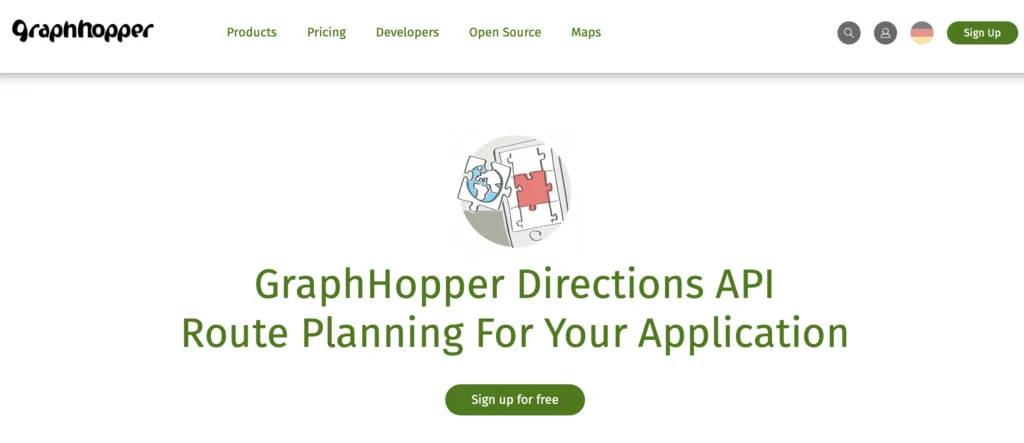
GraphHopper Directions API is a powerful and budget-friendly solution for seamless route planning and optimization. With global coverage and effortless integration, it leverages OpenStreetMap data to deliver fast and efficient navigation for your applications. This is Open-Source Route Planning Software.
Key Features
- Routing: Provides fast and efficient route planning for multiple transportation modes, including driving, cycling, and walking.
- Geocoding: Converts addresses into coordinates (forward geocoding) and vice versa (reverse geocoding) with OpenStreetMap-based data.
- Isochrone: Generates travel time polygons to visualize reachable areas within a specific duration.
- Matrix API: Computes travel distances and times between multiple locations, ideal for logistics and fleet management.
Pros and Cons
✅ Allows for fine-tuned routing profiles by adjusting weightings for different road types, avoiding specific areas, or prioritizing certain features based on transportation mode (car, bike, walking).
✅ Known for its efficient routing algorithms, providing quick route calculations even for complex queries.
✅ Developers can access and modify the source code to tailor the routing engine to specific needs.
❌ Configuring complex routing profiles with custom weighting and restrictions can require technical knowledge.
❌ May not always perfectly reflect local road conditions or nuances in specific areas depending on the quality of OpenStreetMap data.
❌ Using the open-source version necessitates setting up and managing your own server infrastructure.
Pricing
GraphHopper has the following pricing plans:
- Free Plan: This plan is priced at €0 per month with 500 credits per day, maximum locations per request is 5, route optimization API is up to 1 vehicle per request, and not permitted for commercial use.
- Basic Plan: This plan is priced at €56 per month with 5,000 credits per day, maximum locations per request is 30, route optimization API is up to 2 vehicles per request, E-mail support, and commercial use is permitted.
- Standard Plan: This plan is priced at €160 per month with 15,000 credits per day, maximum locations per request is 80, route optimization API is up to 10 vehicles per request, E-mail support, and commercial use is permitted.
- Premium Plan: This plan is priced at €384 per month, credits per day is 50,000, maximum locations per request is 200, route optimization API is up to 20 vehicles per request, E-mail and telephone support, and commercial use is permitted.
- Custom Plan: This plan is priced on requirements, maximum locations per request is up to 10,000, route optimization API is up to 200 vehicles per request, dedicated support available, and commercial use is permitted.
3. Open Source Routing Machine (OSRM)

The Open Source Routing Machine (OSRM) is a high-performance routing engine, implemented in C++, designed for calculating the shortest paths in road networks. Licensed under the permissive 2-clause BSD license, OSRM is a free and open-source network service. It is compatible with multiple platforms, including Linux, FreeBSD, Windows, and macOS.
Key Features
- Dynamic ‘Click-to-Drag’ Routing: Allows you to interactively modify routes by clicking and dragging waypoints, similar to Google Maps.
- Alternative Routes: Provides multiple route suggestions to help you choose the best path based on distance, travel time, or road conditions.
- Free-to-Use API: Offers a powerful, cost-free API for developers to integrate high-performance routing capabilities into their applications.
- Open-Source & BSD Licensed: Released under the permissive 2-clause BSD license, OSRM is free to use, modify, and distribute for both commercial and non-commercial projects.
Pros and Cons
✅ OSRM employs contraction hierarchies and other advanced algorithms to deliver exceptionally fast route calculations, making it ideal for real-time and responsive web applications.
✅ As an open-source project under the BSD license, OSRM is completely free to use, modify, and integrate into custom applications without licensing restrictions.
✅ OSRM supports various transportation modes, including car, bicycle, and pedestrian routing, with customizable profiles to fine-tune routing preferences.
❌ OSRM requires a significant amount of RAM for pre-processing and storing routing data, making it less suitable for environments with limited memory resources.
❌ Once the routing graph is precomputed, dynamically modifying route weights based on specific conditions (e.g., weather, road closures) is challenging.
Pricing
Open Source Routing Machine (OSRM) is entirely free to use, as it is open-source software. You can download, install, and leverage its routing capabilities without any direct costs. Licensed under the permissive 2-clause BSD license, OSRM is accessible to anyone without requiring subscription fees.
- No Direct Cost – OSRM provides core routing functionalities completely free of charge.
- Open-Source Flexibility – The software is freely accessible and can be customized to meet specific requirements.
- Infrastructure Costs – While OSRM itself is free, running a self-hosted instance may involve expenses for server maintenance, cloud hosting, and data processing.
4. pgRouting

pgRouting is an open-source extension for PostGIS / PostgreSQL that enables advanced geospatial routing functionality. Licensed under GPLv2, it is actively supported by a growing community of individuals, businesses, and organizations.
Unlike traditional routing engines that require preprocessing, pgRouting dynamically computes routes in real-time, ensuring that data updates are reflected immediately. It allows flexible integration with multiple clients, including QGIS, JDBC, ODBC, and PL/pgSQL, and can be accessed from both PCs and mobile devices.
Key Features
- Database Integration: Extends PostGIS/PostgreSQL for geospatial routing.
- Multiple Algorithms: Supports shortest path, driving distance, and turn restrictions.
- Customizable: Allows for complex queries and custom routing solutions.
Pros and Cons
✅ Seamless integration with spatial databases.
✅ Suitable for complex geospatial analyses
✅ Active open-source community.
❌ Requires knowledge of SQL and database management.
Pricing
pgRouting is completely free and open-source under the GPLv2 license. This means:
- No Licensing Fees: pgRouting can be used without any cost.
- Free to Modify & Distribute: You can customize and extend the software as needed.
- No Subscription or API Costs: Unlike commercial routing solutions, pgRouting does not charge for usage.
5. Valhalla

VALHALLA is a modern, open-source routing engine designed to deliver fast, efficient, and flexible routing solutions. It leverages a tiled graph hierarchy to significantly improve performance by loading only the necessary map tiles into memory, ensuring both speed and low resource consumption. This structure also enables you to create regional extracts from a global dataset easily, which is ideal for localized applications.
Key Features
- Tiled Graph Hierarchy: Routing on a hierarchical graph greatly enhances performance, enabling fast and efficient route computations. Only the relevant tiles are loaded into memory, ensuring optimal resource usage. Build the entire world dataset once and easily create focused regional extracts for localized applications.
- Functionality: Provides a suite of APIs including Routing, Isochrones, Matrix, Map Matching, Elevation, Traveling Salesperson Problem (TSP), and Locate. All costing options are fully dynamic; they can be adjusted per request to account for factors such as vehicle dimensions and preferences to favor or avoid specific road features. You can specify departure or arrival times, making it possible to incorporate traffic data and support public transit routing.
- Historical and Live Traffic Integration: Leverages both historical and live traffic information to optimize estimated time of arrival (ETA) for car-bound routing. Supports arbitrary departure and arrival times similar to services like Google Maps, allowing for more precise trip planning. Traffic data is integrated into nearly all actions (such as routing, isochrones, and expansion), enhancing route accuracy, with the exception of the Matrix API.
Pros and Cons
✅ Integrates both historical and live traffic data to compute more accurate ETAs and better route selections.
✅ Offers support for various transportation modes including car, public transit, walking, and cycling.
✅ The ability to build the global dataset once and then create regional extracts simplifies management and deployment.
❌ With a wide range of functionalities, integrating and configuring the APIs effectively might require significant expertise.
❌ Setting up VALHALLA, especially with its dynamic and multimodal capabilities, may require specialized knowledge to ensure optimal configuration and maintenance.
Pricing
VALHALLA is an open-source routing engine and is completely free to use. There are no subscription fees or licensing costs, as its source code is available under an open-source license. However, here are some considerations regarding its use:
- Self-Hosted Deployment:
While VALHALLA itself is free, deploying and maintaining your own instance may incur costs related to:- Infrastructure: Expenses for cloud hosting or on-premise servers.
- Maintenance: Resources required for system updates, backups, and monitoring.
- Technical Expertise: Costs associated with setup and customization.
- Infrastructure: Expenses for cloud hosting or on-premise servers.
- Third-Party Hosted Services:
Some providers may offer managed VALHALLA hosting solutions. These services typically charge based on usage, support, and additional features, but such costs are determined by the service provider rather than VALHALLA itself.
6. OptaPlanner
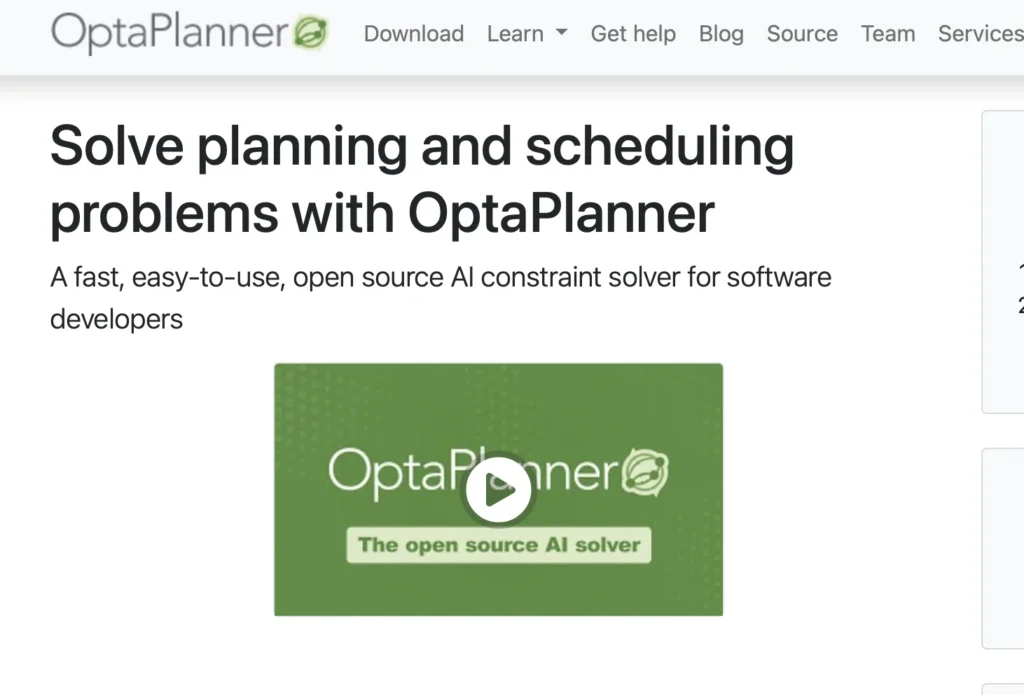
OptaPlanner is a fast, easy-to-use, open-source AI constraint solver for software developers. It is the leading open-source Java AI constraint solver to optimize the vehicle routing problem, the traveling salesman problem, and similar use cases.
Key Features
- Optimized Fleet Routing: Generates quicker, more efficient routes for fleets of vehicles, reducing travel time and operational costs.
- Resource Efficiency: Utilizes techniques like bin packing and defragmentation to optimize the allocation of cloud resources, reducing costs and improving performance.
- Reduced Makespan: Optimizes production schedules on assembly lines to minimize the total time required for completing jobs, thereby increasing throughput.
Pros and Cons
✅ OptaPlanner allows you to model complex vehicle routing problems (VRP) with numerous constraints (e.g., time windows, vehicle capacities, driver preferences). This flexibility enables organizations to tailor solutions to their specific operational needs.
✅ Utilizing state-of-the-art metaheuristics and constraint programming, OptaPlanner can generate efficient and near-optimal routes even for large fleets. Its capability to balance various constraints ensures practical and cost-effective routing.
✅ A robust community and comprehensive documentation facilitate knowledge sharing and provide support for troubleshooting and customization, making it easier for organizations to adopt and refine the solution over time.
❌ The flexibility and power of OptaPlanner come with a complexity that may require a deep understanding of constraint programming and optimization algorithms. Users without prior experience might find it challenging to get started.
❌ Integrating OptaPlanner into existing systems may require significant development effort, particularly when customizing the solver for unique operational constraints. This can add to the overall implementation time and cost.
Pricing
OptaPlanner is available free of charge. This means you can download, use, modify, and distribute it without any licensing fees. Being an open-source project, you benefit from a vibrant community that contributes to documentation, forums, and troubleshooting, which can help you implement and optimize your routing solutions without additional costs.
7. Mapotempo

Mapotempo Web is a robust route planning and optimization solution crafted to simplify delivery and collection operations. Its advanced algorithms efficiently reduce operational costs and travel distances while its intuitive interface enhances overall customer satisfaction.
Key Features
- Complete Vehicle Configuration: Configure detailed vehicle attributes including capabilities, working hours, fuel consumption, departure and destination details, and even driver or delivery person information.
- Open-Source Integration: Option to integrate free and open-source route planning software for managing customer destinations efficiently.
- Customizable Filters & Database Optimization: Develop tailored filters to optimize your database, allowing you to reset or change routes with a single click for flexibility in operations.
- Real-Time Traffic Data: Calculate estimated times of arrival (ETAs) using up-to-date traffic data for more accurate scheduling and routing.
Pros and Cons
✅ Offers a complete suite of features from vehicle configuration to route optimization and performance reporting, covering all aspects of delivery management.
✅ Custom filters, one-click route adjustments, and dynamic route calculation optimization make it highly adaptable to various operational needs.
✅ Supports monitoring via smartphone apps and integrates with other systems, offering flexibility in how and where you manage your routes.
❌ The breadth of features and customization options might be overwhelming for new users or smaller operations without dedicated technical support.
❌ Incorporating third-party services (such as TomTom solutions) may require additional configuration and could present integration challenges.
Pricing
Mapotempo typically offers its route planning and optimization software on a subscription basis.
- Basic Plan: Features include Core route planning, vehicle configuration, and basic optimization capabilities. Ideal for small fleets or businesses just getting started with route optimization. Pricing model is typically a monthly fee per vehicle or a flat rate for a limited number of vehicles and routes.
- Professional Plan: Features include everything in the Basic plan plus advanced features such as zoning, customizable filters, dynamic route reset options, and integration with real-time traffic data (including TomTom solutions for vehicle tracking). Ideal for medium-sized operations needing enhanced route management and detailed performance reporting.
- Enterprise Plan: Features Include a fully customizable solution with comprehensive route optimization, advanced analytics, integration support, and dedicated account management. This tier often includes additional services such as custom feature development and priority support. Ideal for large fleets and organizations with complex routing needs that require a tailored solution.
8. Vroom

Vroom is an open-source vehicle routing engine known for its simplicity and speed, designed to solve routing problems efficiently.
Key Features
Focuses on vehicle routing optimization with support for various constraints and scenarios, using an easy-to-use interface.
Pros and Cons
✅ Lightweight and highly performant.
✅ Simple setup and usage, ideal for small to medium-scale applications.
✅ Open-Source with a user-friendly API.
❌ Fewer features compared to some larger, more comprehensive engines.
❌ May not handle extremely complex routing scenarios as effectively as some alternatives.
Pricing
Vroom is an open-source vehicle routing engine, which means:
- Free and Open-Source: Vroom is available at no cost under an open-source license (typically the MIT License), so there are no subscription fees or licensing costs associated with the core software.
- Self-Hosting Considerations: While the software itself is free, deploying Vroom on your own infrastructure may incur expenses such as server hosting, maintenance, and any necessary scaling resources.
- Third-Party Managed Services: Some third-party providers might offer hosted versions of Vroom with additional support or integration services, and these offerings would come with their own pricing structures. However, these costs are determined by the service providers, not by the Vroom project itself.
9. RouteXL

RouteXL is a versatile multi-stop route planner designed for road trips with numerous destinations. It intelligently optimizes the sequence of stopovers to create the fastest itinerary, significantly reducing travel time. This efficient route optimization not only saves fuel and cuts costs for businesses handling daily pickups, deliveries, and on-site services but also contributes to a cleaner environment through lower emissions.
Key Features
- Route Optimization: Utilizes advanced algorithms to determine the most efficient travel paths, reducing overall travel time and fuel consumption while ensuring timely arrivals.
- Work Order Delivery: Streamlines the dispatch and scheduling process by integrating work orders directly into the routing system, ensuring that pickups, deliveries, and service calls are efficiently managed.
- GPS Location Tracking: Offers precise real-time tracking of vehicles, enabling fleet managers to monitor progress, optimize route adjustments on the fly, and ensure accurate delivery status.
- Route Simulation: Allows you to simulate various routing scenarios before deployment, testing different strategies to identify the most cost-effective and efficient routes under varying conditions.
Pros and Cons
✅ Offers tools to monitor vehicle performance and real-time positioning, enhancing fleet management and safety.
✅ Automatically calculates the most efficient order of stops, reducing travel time and fuel consumption.
❌ While it offers robust features, integrating RouteXL with other systems (e.g., vehicle diagnostics hardware or external databases) might require additional technical effort.
❌ Costs are determined by the extent of usage, which could become expensive for high-frequency or large-scale routing needs.
Pricing
RouteXL employs a usage-based pricing model with subscriptions billed in US dollars. Here’s a breakdown of the pricing approach:
- Usage-Based Billing: Costs are determined by your actual usage of the service, ensuring that you only pay for the routes and stops you plan.
- No Free Version: RouteXL does not offer a free tier; access to its route planning and optimization features requires a subscription.
- Flexible Payment Options: Customers can choose between monthly payments or an annual subscription, allowing you to select the option that best fits your budgeting needs.
10. Openrouteservice

The Openrouteservice API leverages free geographic data that is both user-contributed and collaboratively gathered directly from OpenStreetMap. Essentially, Openrouteservice services are designed to work anywhere in the world, taking full advantage of OpenStreetMap’s extensive global street network, comprehensive address database, and a rich array of supplementary data to enhance your results.
Key Features
- Route Optimization: Leverages advanced algorithms to calculate the most efficient itineraries, reducing travel time and fuel consumption for multi-stop journeys.
- Vehicle Maintenance Integration: While not a standalone maintenance tool, Openrouteservice can be integrated with fleet management systems to schedule and monitor vehicle maintenance, ensuring vehicles remain in optimal condition.
- Wireless Dispatching: Supports wireless dispatch capabilities, allowing for real-time communication and assignment of routes via mobile devices and connected networks.
- Routing Alerts: Sends timely alerts and notifications regarding route deviations, delays, or unforeseen traffic conditions, allowing operators to take proactive measures.
Pros and Cons
✅ Leverages free, user-contributed OpenStreetMap data, ensuring extensive global street coverage, detailed addresses, and a wealth of supplementary information.
✅ Being Open-Source, benefits from community contributions and continuous updates, while also offering transparency and flexibility for customization.
❌ Advanced functionalities like vehicle diagnostics, maintenance integration, and wireless dispatching may require additional third-party systems or custom development.
❌ In areas where OSM data is less detailed or updated, performance and routing accuracy may be affected, potentially leading to less optimal route planning.
Pricing Type
- The core service is available for free, making it accessible for small projects and initial development work.
Payment Frequency for Premium Tiers
- In addition to the free plan, Openrouteservice also offers premium tiers that are billed on a monthly basis. These tiers provide increased usage limits and additional features for high-demand applications.
Free Trial
- For those interested in exploring the premium features, there is a free trial option available. This allows potential users to test and evaluate the service before committing to a monthly subscription.
Conclusion
NextBillion.ai leverages open-source technologies and comprehensive mapping data to deliver robust route optimization solutions that address everyday challenges. For businesses with complex, custom requirements, NextBillion.ai further elevates its offering by integrating advanced, proprietary features that enable dynamic constraint handling, real-time traffic integration, and tailored industry-specific enhancements. This combination makes NextBillion.ai an ideal choice for organizations seeking both the flexibility of open-source innovation and the power of specialized, turnkey solutions for their most demanding routing and resource management needs.
In contrast, the top open-source tools available in 2025 offer robust, cost-effective, and flexible solutions that leverage extensive mapping data and community contributions. However, these tools typically require more customization and technical expertise to address complex, industry-specific challenges. NextBillion.ai translates open-source structures into bespoke solutions, seamlessly infusing advanced features like dynamic constraint handling and real-time adjustments, and therefore positioning itself as the go-to solution for businesses with intricate routing needs.
In summary, NextBillion.ai not only harnesses the power of open data and mapping technologies but also elevates them with specialized capabilities to deliver a superior, all-encompassing route optimization solution. This combination makes it an ideal choice for organizations seeking to transcend the limitations of conventional open-source tools and achieve exceptional performance and efficiency in their operational routing and resource management.
About Author
Prabhavathi Madhusudan
Prabhavathi is a technical writer based in India. She has diverse experience in documentation, spanning more than 10 years with the ability to transform complex concepts into clear, concise, and user-friendly documentation.

